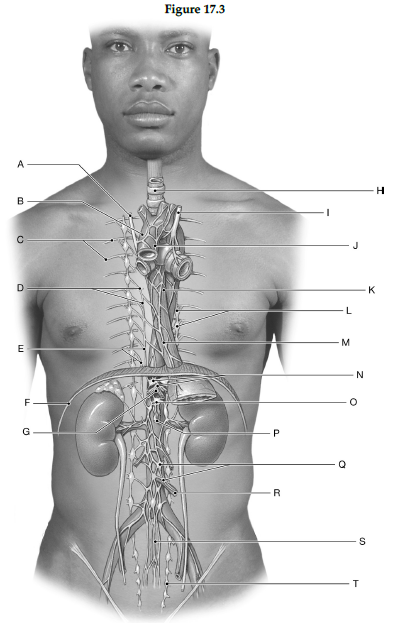Using the figure below, identify the labeled part.

1) Label A: ______________________________
2) Label B: ______________________________
3) Label C: ______________________________
4) Label D: ______________________________
5) Label E: ______________________________
6) Label F: ______________________________
7) Label G: ______________________________
8) Label H: ______________________________
9) Label I: ______________________________
10) Label J: ______________________________
11) Label K: ______________________________
12) Label L: ______________________________
13) Label M: ______________________________
14) Label N: ______________________________
15) Label O: ______________________________
16) Label P: ______________________________
17) Label Q: ______________________________
18) Label R: ______________________________
19) Label S: ______________________________
20) Label T: ______________________________
1) Right vagus nerve
2) Aortic arch
3) Thoracic spinal nerves
4) Pulmonary plexus
5) Splanchnic nerves
6) Diaphragm
7) Celiac trunk
8) Trachea
9) Left vagus nerve
10) Cardiac plexus
11) Esophagus
12) Thoracic sympathetic chain ganglia
13) Esophageal plexus
14) Celiac plexus and ganglion
15) Superior mesenteric ganglion
16) Superior mesenteric artery
17) Inferior mesenteric plexus and ganglion
18) Inferior mesenteric artery
19) Hypogastric plexus
20) Pelvic sympathetic chain
You might also like to view...
The hormone that is the basis for a pregnancy test is ________.
A) human placental lactogen (hPL). B) relaxin. C) progesterone. D) human chorionic gonadotropin (hCG). E) LH.
Among the important and complex events that occur during development are which of the following?
(1) cleavage (2) embryogenesis (3) ovulation (4) spermiogenesis (5) placentation (6) implantation A) 1, 2, 3, 4, 5, 6 B) 1, 3, 5 C) 2, 3, 4 D) 1, 2, 5, 6 E) 2, 4, 6
The "P" in PLR stands for __________
Fill in the blank(s) with correct word
Which type of cell is the most effective to attack multicellular parasites such as tapeworms?
A. Basophils B. Neutrophils C. Eosinophils D. Macrophages